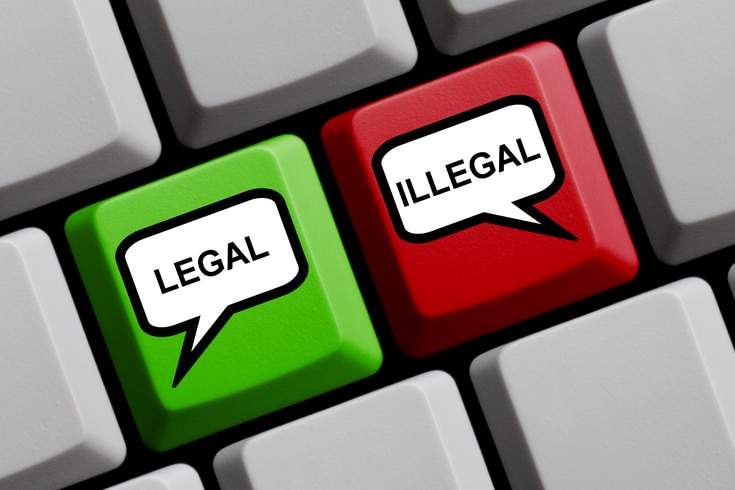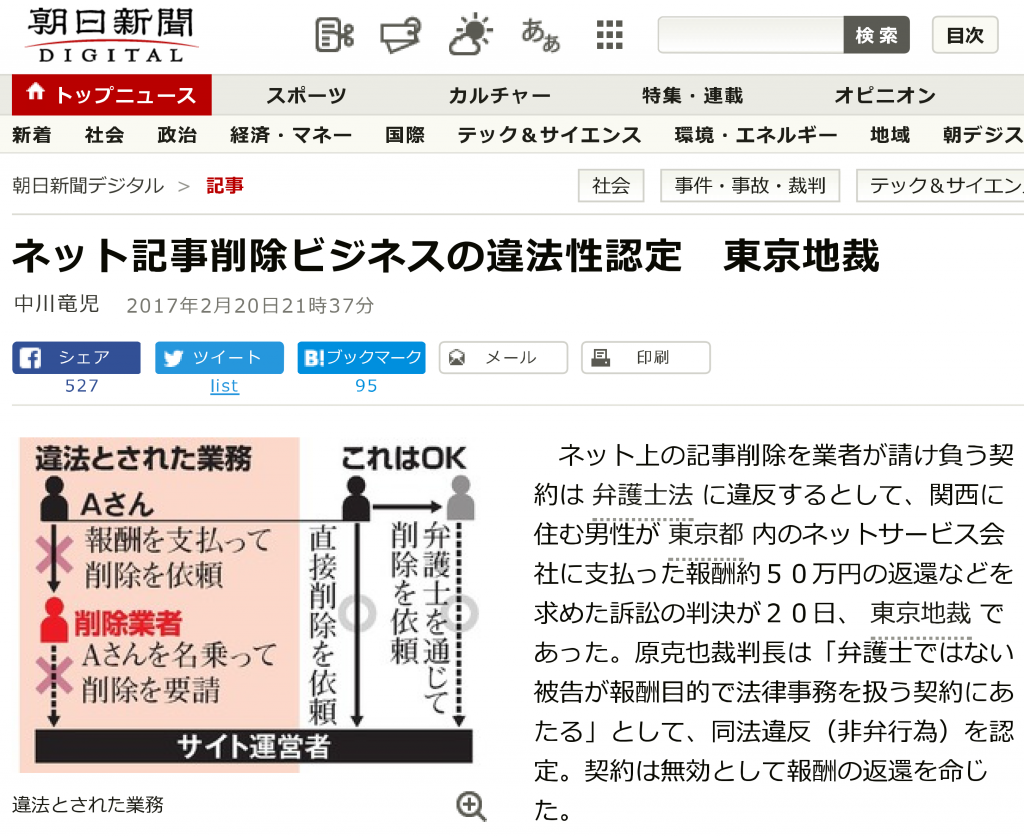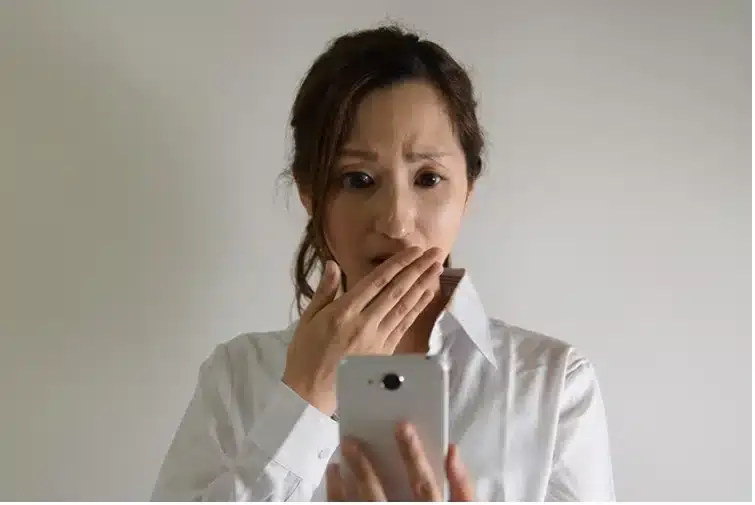Where Does Unauthorized Practice of Law Begin? Explaining Legal Acts That Only Lawyers Can Perform

There may be instances where non-lawyers performing legal services for compensation can be considered illegal unauthorized practice of law.
While provisions are set forth in Article 72 of the Japanese Attorney Act, it is not clear from the text alone where the line is drawn for unauthorized practice of law. So, under what circumstances would one be considered to be engaging in unauthorized practice of law?
For example, what about the reputational damage control measures taken by ‘IT consulting firms’, the rent negotiations conducted by ‘real estate companies’, or the increasingly heard of ‘retirement proxy services’?
In addition to these, we will also explain other instances of unauthorized practice of law, including those by judicial scriveners.
What is Unauthorized Practice of Law? It’s not Unauthorized if it’s Unpaid
Unauthorized Practice of Law and the Japanese Attorney Act

Unauthorized practice of law refers to a non-lawyer repeatedly performing legal services with the intention of receiving compensation.
In other words, helping a friend without receiving any payment does not constitute unauthorized practice of law. However, if a company that provides defamation countermeasures performs legal services for a fee, it would be considered unauthorized practice of law.
Those who are not attorneys or law firms cannot engage in the business of handling legal affairs such as appraisal, representation, arbitration, or settlement, or brokering these matters, for the purpose of receiving compensation in litigation cases, non-litigation cases, and complaints against administrative agencies, among other general legal matters. However, this does not apply if there are special provisions in this law or other laws.
Article 72 of the Japanese Attorney Act
Furthermore, those who engage in unauthorized practice of law can be sentenced to up to two years in prison or fined up to 3 million yen. So, what exactly are the “legal affairs” related to “legal matters” that, as mentioned above, if performed repeatedly, would constitute unauthorized practice of law?
Also, in the context of so-called reputational damage countermeasures, what can consulting firms and IT companies do, and what should they not do?

What are “Legal Affairs” Related to “Legal Matters”
First, there is a concept of “legal matters and affairs” under the Japanese Attorney Act. Simply put, the act of “asserting rights and making a claim against another party” falls under “legal matters and affairs”. Only the person involved and those who are legally permitted can perform these tasks.
While attorneys fall under the category of “those who are legally permitted”, the “person involved” also qualifies. This is easier to understand if you think of a lawsuit.
You can conduct a lawsuit on your own without relying on an attorney. This is called a “pro se lawsuit”.
The same applies to claims outside of court, such as requests for transmission prevention measures (deletion requests).
There is no problem with doing it yourself. However, the people you can ask to “represent” you are limited. Only attorneys can handle deletion requests.
Examples of Unauthorized Legal Practice

Here, we will specifically introduce examples of unauthorized legal practices that are often problematic, such as those by real estate agents, judicial scriveners, and web-based IT companies.
Unauthorized Legal Practice by Real Estate Agents
In the real estate industry, transactions often involve large sums of money, making disputes likely to occur. Therefore, real estate agents need to be careful not to engage in unauthorized legal practices.
Let’s take the example of “negotiating rent”.
Suppose a real estate agent receives a request from the owner of a property to negotiate rent and other terms with the tenant.
In this case, if there is a repetitive and continuous exchange of money (such as receiving a fee from the owner), it constitutes an illegal unauthorized legal practice.
Also, “land speculation negotiations” and “eviction negotiations” can also fall under unauthorized legal practices.
Negotiations to evict land users, which fall under the scope of attorney’s work, and eviction negotiations for rental apartments, are considered unauthorized legal practices if they involve the exchange of money and are essentially carried out as an agent.
However, “real estate brokers” involved in real estate transactions can be qualified as mediators of ADR (a type of out-of-court dispute resolution method at the Japan Real Estate Arbitration Center) if they complete certain training and meet the requirements.
Real estate brokers who have obtained the qualification to become an ADR mediator can also mediate settlements, which they normally cannot do as they essentially fall under unauthorized legal practices.
However, this is limited to activities in out-of-court ADR.
Unauthorized Legal Practice by Judicial Scriveners
The work performed by professionals other than attorneys, such as judicial scriveners, social insurance labor consultants, and administrative scriveners, tends to be problematic as unauthorized legal practices as their fields are similar to those of attorneys.
For example, a judicial scrivener can act as an agent in civil cases of up to 1.4 million yen if certified. In other words, in a lawsuit where you want to “recover a loan of 1 million yen,” a judicial scrivener can also act as an agent in court.
However, the lawsuits in which a judicial scrivener can act as an agent are limited to those with a claim amount of 1.4 million yen or less.
Defamation countermeasures, deletion requests in legal proceedings, and sender information disclosure requests are different from disputes over lending and borrowing money. In most cases, it is extremely difficult to calculate the amount of the claim, and there is a legal provision that if it is extremely difficult to calculate the amount of the claim, it is considered to be 1.6 million yen.
As a result, these exceed the claim amount of 1.4 million yen that a judicial scrivener can act as an agent for, so a judicial scrivener cannot handle defamation countermeasure cases.
Unauthorized Legal Practice by Web-based IT Companies
For IT companies, it’s even more clear. They are not “professionals” in the first place, and they cannot represent “legal cases” or “legal affairs” in any sense.
Therefore, IT companies cannot handle defamation countermeasure cases. However, if it is a simple monitoring or reverse SEO, etc., which are IT measures, it does not fall under “legal cases” or “legal affairs”, so within this range, IT companies can legally carry out “defamation countermeasures”. In fact, there are several companies that are doing so.
Specifically,
<Only attorneys can>
- Use court procedures such as lawsuits and provisional dispositions to delete pages
- Identify the poster (only attorneys can do this because it is not possible to identify the poster without using attorney’s work)
- Delete pages through negotiation or reporting without using a lawsuit (to be mentioned later)
- Delete Google Suggest, etc. using lawsuits or reporting methods
- Delete Google search results
<Others also can>
- Delete Google Suggest, etc. using IT methods
- Monitor online reputation damage
- So-called reverse SEO
That’s how it is.
Unauthorized Legal Practice by Resignation Proxy Service Providers
In recent years, more and more people are quitting their jobs using resignation proxy services, but depending on the content of the service, it may fall under unauthorized legal practice.
If they are simply submitting a resignation letter on behalf of the person wishing to resign, there is no problem.
On the other hand, if they receive a fee and act as a proxy for negotiations related to resignation, it constitutes unauthorized legal practice.
The negotiations related to resignation mentioned here include claims for unpaid wages and overtime pay, and negotiations related to paid leave and retirement allowances. Note that it does not matter whether the content of the negotiation is related to money.
When using a resignation service, you need to understand that service providers who are not attorneys can only act as proxies for submitting resignation letters and cannot be asked to negotiate. Make sure to confirm that the provider is not illegal.
Also, if someone who is not an attorney offers to negotiate under the guise of a resignation proxy service, do not engage with them and consult with your local bar association, police, or an attorney.
Case Law Deeming Article Deletion by a Consulting Firm as Unauthorized Legal Practice

On February 20, 2017 (Heisei 29), an intriguing judgment was issued by the Tokyo District Court, ruling that article deletion by a consulting firm constitutes unauthorized legal practice.
The plaintiff, a doctor, was accused of being involved in a paper fabrication scandal around 2006 (Heisei 18) when he was a medical student at a university. Even now, when the plaintiff’s name is searched, pages related to the fabrication appear. To remove the defamatory articles, the plaintiff requested the defendant’s for their services.
The defendant is a consulting firm that conducts “defamation cleaning,” dealing with negative information on the Internet.
The issue arose when the article deletion was not fully realized.
The plaintiff argued that the actions of the deletion agency constitute “unauthorized legal practice,” which becomes illegal when performed by anyone other than a lawyer. The plaintiff demanded a refund of the fees paid to the deletion agency, and the Tokyo District Court fully accepted the plaintiff’s claim.
The Tokyo District Court examined whether the contract in the matter (the defendant’s article deletion action) violated Article 72 of the Japanese Attorney Act and found that:
- It is clear that the defendant is not a law firm.
- The defendant’s request to the website operator to delete each article can be said to constitute a “legal event” as it generates a new legal obligation and results in the removal of the plaintiff’s infringed personal rights.
- Requesting the website operator to delete using the reporting form provided by each website generates a legal effect of creating a deletion obligation and can be considered as handling matters to preserve and clarify the plaintiff’s personal rights. Therefore, the above business conducted by the defendant for the deletion of each article falls under “other legal affairs.”
- It is clear that the defendant repeatedly handled the above legal affairs, as it conducted business dealing with negative information on the Internet under the name of “defamation cleaning,” and created standard documents such as estimate/application forms, business consignment contracts, and confidentiality agreements.
- Since the defendant received money from the plaintiff as a fee for the deletion service based on this contract, it can be said that the defendant has a “purpose of earning remuneration.”
Therefore, the court ruled, “Based on the above, this contract can be said to be a contract that involves the defendant, who is not a law firm, handling legal affairs related to the plaintiff’s legal event for the purpose of earning remuneration and as a business, and overall, it involves actions prohibited by the first half of Article 72 of the Attorney Act.” The court recognized the article deletion by the consulting firm as unauthorized legal practice.

Furthermore, the remuneration obtained by the defendant through unauthorized legal practice is considered unjust enrichment, and in light of Article 90 of the Japanese Civil Code, it was deemed invalid and a full refund was ordered.
This judgment determined that deletion agency services are not permitted for anyone other than lawyers.
Therefore, the “deletion agency services” often seen on the Internet are illegal.
Those who have relied on deletion agencies to remove articles or those whose issues have not been resolved due to incomplete deletion may have a high chance of getting their paid fees refunded.
Article Deletion by Companies is Illegal
As in the above case law, requests for deletion to consulting firms and IT companies, etc., are illegal acts and should not be performed.
The above judgment recognizes a full refund of the paid money.
In other words, from the perspective of the consulting company, even if they receive (for example) 1 million yen and do 1 million yen worth of work (as they think), they may be asked to refund the full amount later.
From the company’s perspective, the “money received for unauthorized legal practice” is a kind of “hidden debt” and is very risky. Therefore, if it is a “proper” company, they should not accept it. It is definitely better to avoid it.
Companies Cannot Interfere Between Clients and Lawyers

It is important to note that the rule stating “only lawyers can legally perform tasks such as page removal” does not allow excuses such as:
- The order is placed by a company, but it’s safe because the company’s consulting lawyer is the one who takes action.
- The order is placed by a company, but it’s safe because the company’s in-house lawyer, who is a lawyer, takes action.
- The order is placed by a company, but it’s safe because the company employs a lawyer as a subcontractor.
In other words, while the rule that “only lawyers can act as representatives in court” is generally understood, it also does not allow for situations where, for example, “if an order is placed with an advertising agency, a lawyer goes to court as a subcontractor of that advertising agency.”
Put another way, the phrase “only lawyers can act as representatives in court” means that “it is not permissible for a company to be involved in the contractual relationship between the client and the lawyer who actually goes to court.”
This applies equally to page removal in reputational damage control. It is not at all permissible for the company that received the order to use a consulting lawyer, an in-house lawyer, or an external lawyer.
In-house Lawyers Cannot Perform Lawyer Duties
Among the examples above, a little more explanation is needed for in-house lawyers.
Lawyers, when performing lawyer duties using their “lawyer” qualification, need to be affiliated with a “law firm.”
If they are simply employed by a company, they cannot perform lawyer duties such as litigation and page removal in the first place.
Therefore, “in-house lawyers” who are employees of a company also need to establish a “law firm” when performing lawyer duties, and they are actually doing so.
Summary: If you want to verify whether an action constitutes unauthorized practice of law, please consult a lawyer

As stated above, individuals other than lawyers are prohibited from providing certain legal services.
Engaging in unauthorized practice of law can result in imprisonment for up to two years or a fine of up to 3 million yen. However, it can be difficult to determine whether the action or request you are considering constitutes unauthorized practice of law.
If it’s not clear whether an action falls under unauthorized practice of law, you should first consult a lawyer at a law firm.
Category: Internet





















